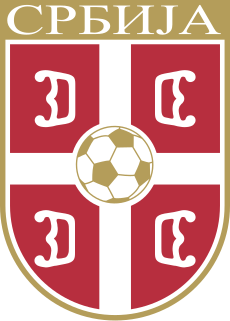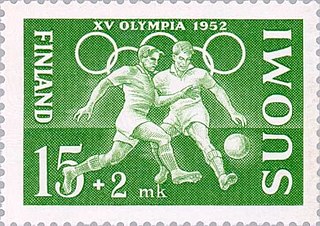
The 1930 FIFA World Cup was the inaugural FIFA World Cup, the world championship for men's national association football teams. It took place in Uruguay from 13 to 30 July 1930. FIFA, football's international governing body, selected Uruguay as host nation, as the country would be celebrating the centenary of its first constitution, and the Uruguay national football team had successfully retained their football title at the 1928 Summer Olympics. All matches were played in the Uruguayan capital, Montevideo, the majority at the Estadio Centenario, which was built for the tournament.

The Serbia national football team represents Serbia in association football and is controlled by the Football Association of Serbia, the governing body for football in the country.
The 1932–33 Yugoslav Football Championship was the 11th season of Kingdom of Yugoslavia's premier football competition.
The 1934–35 Yugoslav Football Championship was the 12th season of Kingdom of Yugoslavia's premier football competition.
The 1936–37 Yugoslav Football Championship was the 14th season of Kingdom of Yugoslavia's premier football competition. It was won by Croatian side Građanski Zagreb.
The 1937–38 Yugoslav Football Championship was the 15th season of Kingdom of Yugoslavia's premier football competition. It was won by Croatian side HAŠK.
The 1938–39 Yugoslav Football Championship was the 16th season of Kingdom of Yugoslavia's premier football competition.

Stjepan Bobek was a Yugoslav football striker and later football manager. Usually a forward or attacking midfielder, Bobek was renowned for his technique, vision and goalscoring ability and is commonly regarded as one of Yugoslavia's greatest players. Ferenc Puskás once said: "Bobek's technique with the ball is unrivaled. I'm not ashamed to admit, that I tried to copy him. How God-like that guy dribbled and his back-heel pass was impeccable. He still is one of the most noble artists in football."
The 1968–69 Yugoslav First League season was the 23rd season of the First Federal League, the top level association football league of SFR Yugoslavia, since its establishment in 1946. Eighteen teams contested the competition, with Red Star winning their ninth national title.
The 1971–72 Yugoslav First League season was the 26th season of the First Federal League of Yugoslavia, the top level association football competition of SFR Yugoslavia, since its establishment in 1946. A total of 18 teams competed in the league, with the previous season's runners-up Željezničar Sarajevo winning the title.
The 1982-1983 season of the Yugoslav First League, the then top football league in Yugoslavia was won by FK Partizan
Dražan Jerković was a Croatian football forward and manager.

The Serbia and Montenegro national football team was a national football team that represented the State Union of Serbia and Montenegro. It was controlled by the Football Association of Serbia and Montenegro. For 11 years, it was known as the FR Yugoslavia national football team when the two countries were called the Federal Republic of Yugoslavia, until February 2003, when the name of the country was changed to Serbia and Montenegro. In 2006, Montenegro declared its independence from Serbia, with the result that the country's football team was renamed as the Serbia national football team on 28 June 2006 with the Montenegro national football team created to represent the renewed state of Montenegro.
The Serbian SuperLiga is a Serbian professional league for football clubs. At the top of the Serbian football league system, it is the country's primary football competition. It is contested by 16 clubs, operating a system of promotion and relegation with the Serbian First League. The SuperLiga was formed during the summer of 2005 as the country's top football league competition in Serbia and Montenegro. Since summer 2006 after the secession of Montenegro from Serbia, the league only has had Serbian clubs.

The Football tournament at the 1952 Summer Olympics was won by Hungary.
The football tournament at the 1960 Summer Olympics was held from 26 August to 10 September in 1960 throughout Italy. The tournament features 16 men's national teams from four continental confederations. The 16 teams are drawn into four groups of four and each group plays a round-robin tournament. At the end of the group stage, the first-ranked teams of each group advanced to the semi-finals, and culminating with the gold medal match in Rome on September 10, 1960.

Todor "Toza" Veselinović was a Serbian footballer and coach. He was one of the most renowned goalscorers in Yugoslavian national team history.
Ljubomir "Ljubo" Benčić was a Croatian and Yugoslav football player.






